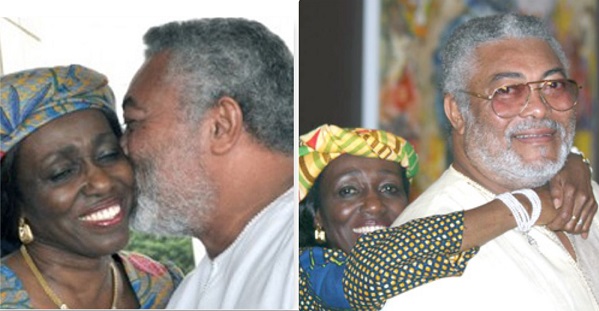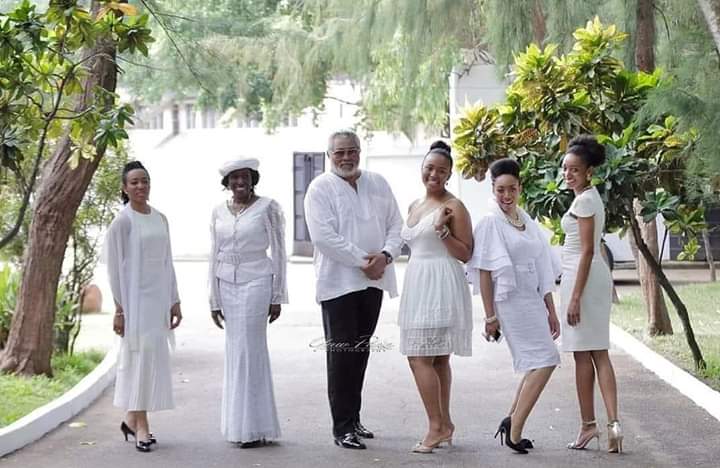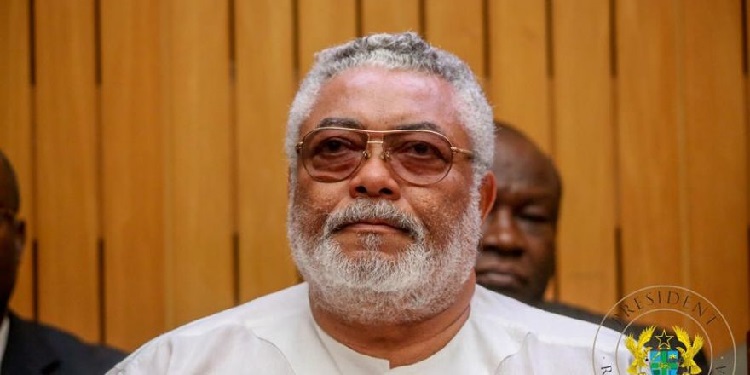Former President Rawlings is dead
Former President Jerry John Rawlings has died weeks after his mother passed on.
Information reaching the theghanareport.com indicates that the former President who led Ghana from December 31, 1981, to January 7, 2001, died at the Korle Bu Teaching Hospital in Accra.
He died from an unknown illness on Thursday, November 12, 2020, at 10.10 am.
He was 73.
The shocking news comes weeks after the former President buried his mother, Madam Victoria Agbotsui on October 19.
The last public appearance he made was at the Forecourt of the State House and Dzelukope during the funeral of his late mother.
In recent times, Mr Rawlings, the country’s longest-serving leader, had limited his public engagement as coronavirus raged in Ghana.
He, however, often took to social media to make pronouncements on issues of national and international discourse.
His last post on Twitter was on November 7.
Congratulations to President-Elect @JoeBiden and Vice President-Elect @KamalaHarris . The world is expectant as a new era of United States leadership dawns. We look forward to a leadership that embraces unity, compassion and maturity.
— Jerry John Rawlings (@officeofJJR) November 7, 2020
The numerous lives that are being lost on account of the regime trying to extend its stay in office is grossly unacceptable. Guinea’s President Alpha Conde must do better to protect the people and deliver their mandate… pic.twitter.com/B4blu41onn
— Jerry John Rawlings (@officeofJJR) October 23, 2020
Even the death of his mother was announced on Twitter.
The Office of H.E. Jerry John Rawlings, the Awadada of the Anlo State, Head of the Royal Bate Family of the Anlo State and the Agbotui and allied families, inform the general public of the demise of Madam Victoria Agbotui, mother of His Excellency… pic.twitter.com/cTCgPehZCU
— Jerry John Rawlings (@officeofJJR) September 25, 2020
The former military strongman left behind his wife and former First Lady, Nana Konadu Agyeman-Rawling and four children–Zanetor, Amina, Asantewaa and Kimathi.
Rawlings burst onto the political scene in May 1979 after a failed coup attempt.
While he was on trial, on June 4, 1979, his peers–junior officers in the Ghana Armed Forces organised another coup that wrestled him from the powers that be.
That military junta, the Armed Forces Revolutionary Council (AFRC) led the country for about 112 days before handing over to Dr Hilla Limann, the only president of Ghana’s short-lived Fourth Republic on September 27, 1979.
He took the gun again to topple Dr Limann on December 31, 1981, forming the Provisional Defence Council (PNDC). Rawlings governed the country as the Chairman of the PNDC for 11 years, before transitioning into a democratic leader when he won the 1992 and 1996 elections on the ticket of the National Democratic Congress (NDC).
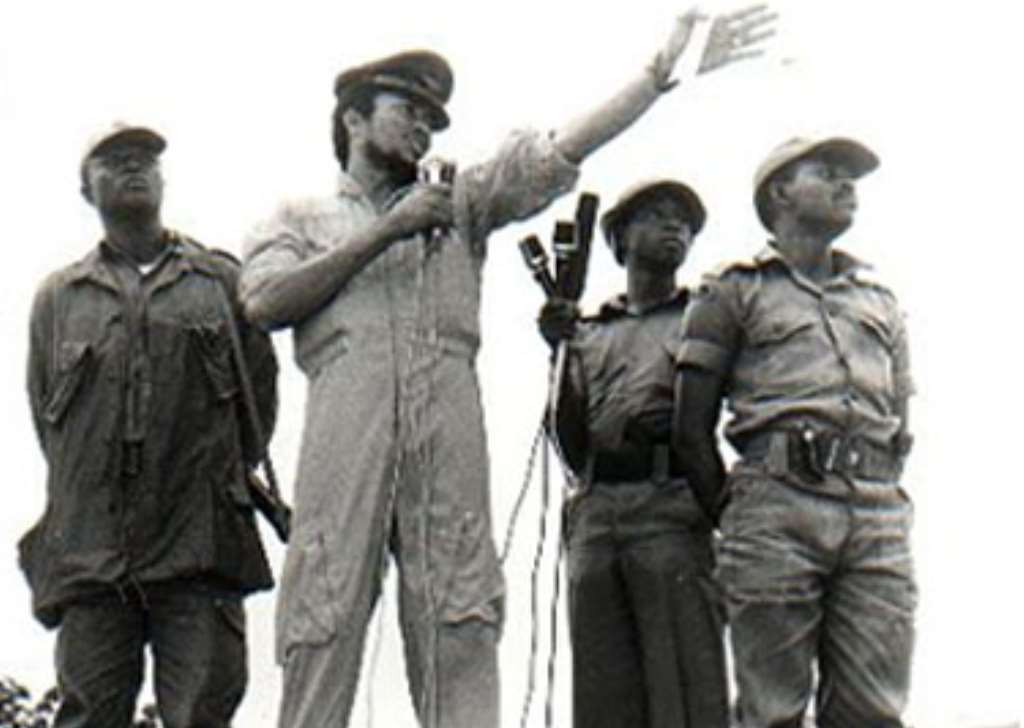

After two terms, he left office on January 7, 2001.
While many credit him with Ghana’s return to multiparty democracy, his critics say his military regime was full of excesses including the murder of three judges and a senior military officer in June 1983.
The economy
Christened “Junior Jesus” in the heat of the revolution, Rawlings courted the Bretton Wood institutions in a move that saved a crumbling economy, where basic necessities including soap and milk were hard to come by.
Backed by the International Monetary Fund and the World Bank, the country embarked on Economic Recovery Programme in the 1980s to reverse a protracted period of serious economic decline characterised by lax financial management, inflation rates of well over 100%, and extensive government involvement in the economy.
By the end of 1991, ERP efforts had improved the country’s international financial reputation because of its ability to make loan repayments (although not wipe out foreign debt) and its first entry onto the international capital market in almost two decades.
With economic reforms biting hard as unemployed soared, the PNDC initiated the US$85 million Programe of Action to Mitigate the Social Costs of Adjustment (PAMSCAD). Beginning in 1988, the programme sought to create 40,000 jobs over a two-year period. It was aimed at the poorest individuals, small-scale miners and artisans in particular, and communities were to be helped to implement labour intensive self-help projects.
It would be followed by the Structural Adjustment Programmes, which injected the much-needed donor support to revive an economy on its knees.
But it came at a cost with severe austerity measures. The interventions also brought in their wake the collapse of many state-owned enterprises, which were divested.
Legacies
However, Rawlings’ economic legacies would include the Value Added Tax (VAT), which was initially met with political resistance from the opposition and civil society organisations, leading to ‘Kume pre ko ‘ demonstration in 1995.
With the country’s fiscal problems holding down the economy, the government reintroduced the tax in 1998, this time with a more effective publication campaign.
The tax later became the backbone of Ghana’s domestic revenue mobilisation.
The Rawlings administration also introduced the Ghana Education Trust Fund (GETFund)–a major financial muscle for educational infrastructure and human resource development.
He also embarked on an extensive rural electrification project that connected thousands of communities nationwide to the national grid.
However, what he lost in economic transformation, he gained in political stability. He is reported to have survived at least 33 coup attempts before he became a civilian President in January 1993.
Many, including President Nana Akufo-Addo, described him as “the father of the Fourth Republic.”
The President announced a wave of measures to mourn the departed leader.
Announcement of the death of former President Rawlings pic.twitter.com/7ext0fp4sd
— Nana Akufo-Addo (@NAkufoAddo) November 12, 2020
Rawlings had always been a crusader against injustice — which influenced his choice of career even at an early age.
In his formative years, he wanted to be a priest to fight injustice.
In a recent interview with renowned journalist, Kwaku Sakyi Addo, Mr Rawlings indicated that the lawlessness around him was very abhorring and he thought being a priest will keep him away from indulging in illegalities and also teach others how to live a virtuous life.
“I wanted to become a priest not so much because I wanted to sing praises and worship God and things like that, but I was looking for ways to deal with the injustices around us, as well as live a virtuous life. Mind you, I was not more than fifteen years and I recall walking on the streets of Accra and I was saying to myself I’m going to punish Nkrumah’s Ministers someday,” he told Kwaku Sakyi Addo.
According to him, he later developed a love for piloting, which made him eventually becoming a pilot, even though his mother was not in agreement with the idea.
“I was young and I started telling my mother I wanted to be a pilot and one day, he looked at my face as I was discussing with her, the slaps that landed on my back, and she almost put her finger on my face and said you will be a doctor. But before she realized, I was a pilot” Flt Lt. Jerry John Rawlings indicated.
Let the blood flow
Buoyed by the call for “blood to flow,” after the June 4 coup, Rawlings signed the execution of a former head of state, General I.K Acheampong; and Lt General Edward Utuka, a former Commander of the Border Guards. The two were found guilty of using their positions to amass wealth and dissipating state funds. A firing squad executed them on June 16, 1979.
Ten days later, two other former heads of state—Gen F.W.K Akuffo and General Kwasi Afrifa, who had retired from the military, but angling for office as a civilian, alongside Major Maj. Gen. R. E. A. Kotei, a former army commander; Air Vice Marshal George Yaw Boakye, a former Air Force Chief, and Admiral Joy Amedume, Chief of the Navy, had their bodies riddled with bullets at the Teshie shooting range. They were found guilty of the same charges as General Acheampong and Lt General Utuka.
Offering his version of the gory past in a recent interview, Rawlings said the people wanted more heads and more flood. So the Armed Forces Revolutionary Council, a group of junior military officers, who overthrew the Supreme Military Council II on June 4, 1979, caved in.
“If it had gone the other way, we could have easily have lost control. You probably have heard me a few times talking about the innocent ones as well. That is the painful one that one has to live with as well, because some of them were good people and didn’t deserve to die. That was the only way we could prevent the thing from getting out of hand,” he explained.

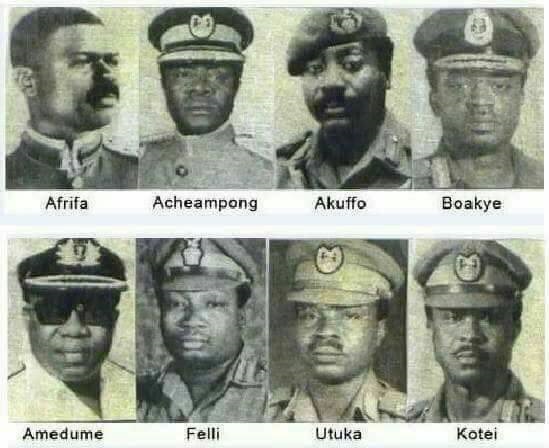
40-year romance
The enigmatic and charismatic founder of the National Democratic Congress (NDC) found love in Nana Konadu Agyeman-Rawlings –a woman who also cut her political teeth massing thousands of women behind her husband during the revolution and the aftermath.
Rawlings recalled the more than the 40-year romantic affair.
“We met at Achimota School and then she claimed I bullied her the first day we came to class, because somehow l found myself in the company of the senior ones.
“Maybe she is right, but she was special even as a young girl, and she is still special and for me, it had to be her,” he said lost between a smile and laughter.
Looking back at all the years together, the former president is convinced he does not deserve her love.
But he was quick to add that nobody deserves her, but himself.
“When we are reincarnated, I will still come back for her. She has always been a good friend,” he noted.
